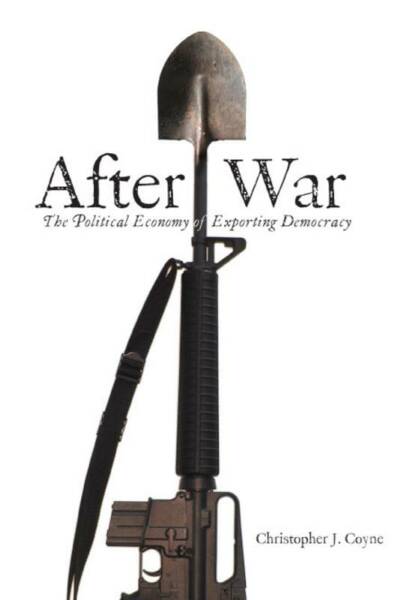

After War:
The Political Economy of Exporting Democracy
After War:
The Political Economy of Exporting Democracy
Stanford University Press, 2008
Editorial Reviews
“The author raises excellent points on the reconstruction process in disrupted states, provides attentive case studies, and proposes controversial but rational solutions to the failures of the latest U.S.-led missions...for practitioners and students of peacebuilding, this volume is also important because it provides a rather rare perspective in this area of research.”
“George Washington argued in his farewell address that the policy rule should be entangling alliances with none, free trade with all. Coyne is the modern-day champion of this fundamental insight of Washington.”
“...peace and welfare may depend on how far the next US president accepts the main lines of his analysis – a subject even more important than the current credit crunch.”
“After War adds a unique perspective on the United States’s ability to impose liberal democratic institutions abroad. In clear prose, Christopher Coyne combines the economic way of thinking with an appreciation of politics, history, culture, and social factors to expose why past efforts to export liberal democracy have failed and why we should be skeptical of future efforts.”
“I view the key analytical point as focusing on the power of on-the-ground expectations to make the reconstruction "game" either a cooperative or combative one. This is a difficult variable to control, but Chris offers a very good look at the best and worst attempts that the United States has made to manipulate these variables and thus export democracy. If you want to know why the Solow model doesn't seem to hold for Bosnia, or a deeper more analytic sense of why Iraq has been a mess, this is the place to go.”
“A brilliant and timely contribution that should shift the debate on U.S. foreign policy and state-building. In providing new insights from economic theory on what can be expected in post-conflict situations, Coyne guides us toward attainable goals and interventions that have a better chance of success.”
“ It is a theoretically sound and empirically rich reminder of the role economics should play in deflating the hubris of those who think they can “reconstruct” what no one ever consciously constructed.”
“ After War supplies valuable historical context and offers new and vital perspectives on what is perhaps the major foreign policy and security challenge facing the United States and Europe at the start of the 21st century.”
“Having recently had an opportunity to read After War,... I've found myself trying out his application of economic principles to the analysis of armed conflicts, particularly in the case of America's current occupation of Iraq. This has proven especially useful.”
Book Description
Why does liberal democracy take hold in some countries but not in others? Why do we observe such different outcomes in military interventions, from Germany and Japan to Afghanistan and Iraq? Do efforts to export democracy help as much as they hurt? These are some of the most enduring questions of our time.
Historically, the United States has attempted to generate change in foreign countries by exporting liberal democratic institutions through military occupation and reconstruction. Despite these efforts, the record of U.S.-led reconstructions has been mixed, at best. For every West Germany or Japan, there is a Cuba, Haiti, Somalia, or Vietnam.
After War seeks to answer these critical foreign policy questions by bringing an economic mindset to a topic that has been traditionally tackled by historians, policymakers, and political scientists. Economics focuses on how incentives influence human action. Therefore, within an economic context, a successful reconstruction entails finding and establishing a set of incentives that makes citizens prefer a liberal democratic order. Coyne examines the mechanisms and institutions that contribute to the success of reconstruction programs by creating incentives for sustained cooperation.
Coyne emphasizes that the main threat to Western nations in the post-Cold War period will not come from a superpower, but rather from weak, failed, and conflict-torn states—and rogue groups within them. It is also critical to recognize that the dynamics at work – culture, historical, and social– in these modern states are fundamentally different from those that the United States faced in the reconstructions of West Germany and Japan. As such, these historical cases of successful reconstruction are poor models for today’s challenges. In Coyne’s view, policymakers and occupiers face an array of internal and external constraints in dealing with rogue states. These constraints are often greatest in the countries most in need of the political, economic, and social change. The irony is that these projects are least likely to succeed precisely where they are most needed.
Coyne offers two bold alternatives to reconstruction programs that could serve as catalysts for social change: principled non-intervention and unilateral free trade. Coyne points to major differences in these preferred approaches; whereas reconstruction projects involve a period of coerced military occupation, free trade-led reforms are voluntary. The book goes on to highlight the economic and cultural benefits of free trade.
While Coyne contends that a commitment to non-intervention and free trade may not lead to Western-style liberal democracies in conflict-torn countries, such a strategy could lay the groundwork for global peace.
Reviews of After War
Paul Norris, Democracy and Security, 2009, 5: 163-166.
Other Media Mentions
Ivan Eland, "Homeward Bound," The National Interest, Jul/Aug2008 (96): 73-80.
